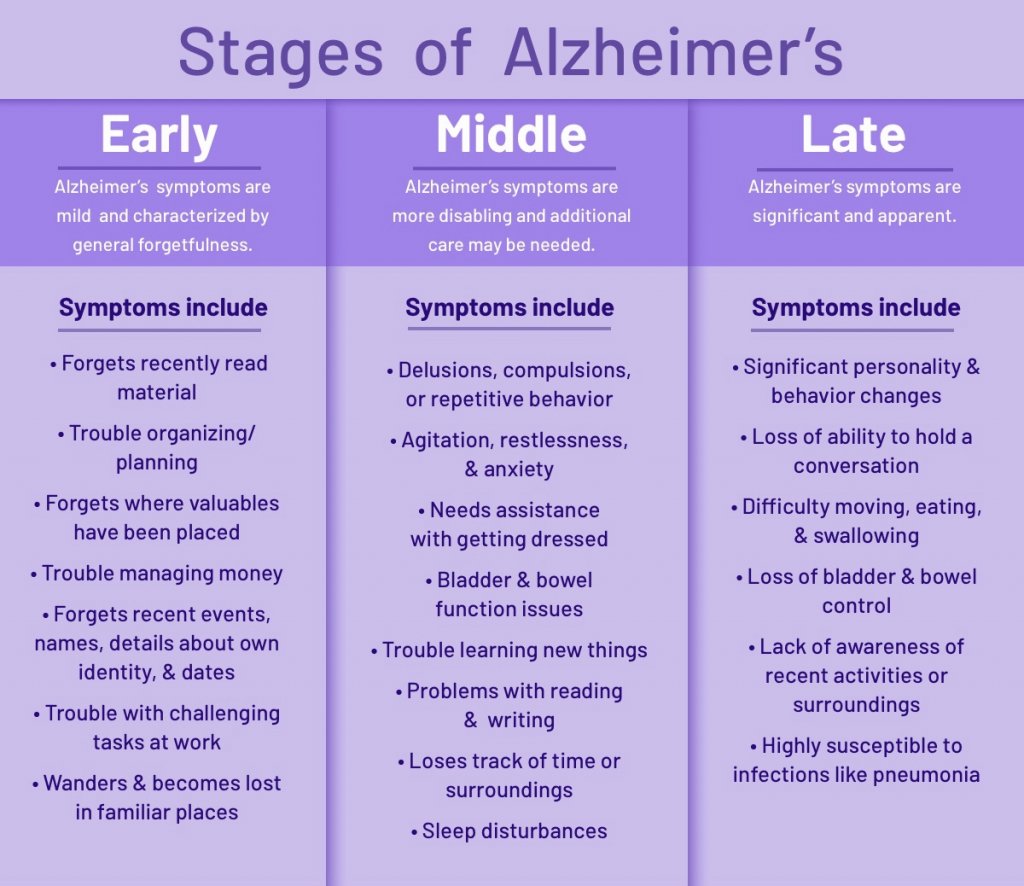
By: dierk schaefer
Alzheimer’s disease is a degenerative condition of the brain that causes impaired cognitive abilities, and can lead to severe memory loss. The primary cognitive abilities that are impaired include the loss of thinking, remembering, and reasoning over time. This is a disease that has a slow onset, and usually progresses over a long period of time. Getting news that a loved one has been diagnosed with Alzheimer’s can be stressful for not only the patient, but also their close friends and family; But, having this knowledge of the disease can be beneficial for everyone involved. Family and friend caregivers can take the necessary precautions to help slow the disease progression, and the patient can be more involved in their care.
Signs & Symptoms
Alzheimer’s Disease is broken down into 3 categories: Early-stage, Middle-stage, and Late-stage. Each stage has specific symptoms, but there can be an overlap within the stages, sometimes making it hard to determine how much someone progressed. It’s important to be aware of the different signs and symptoms your loved one may be showing, so you can provide better care considering their current stage.

Providing Care
Being the caregiver to someone with Alzheimer’s disease is never an easy task to take on, but everything you do means the world to your loved one, even if they can’t show it. As a caregiver, the number one priority to always think about is SAFETY! As this disease progresses, the judgement, perception, and problem-solving skills are impaired, which then increases the risk for injuries. Ways to create a safe environment include:
- Put locks on doors leading outside; lock up medications, alcohol, toxic cleaning substances, or weapons
- Prevent falls with handrails on stairs and in bathrooms; avoid slip rugs in high traffic areas; avoid extension cords
- Fire precautions (have a fire extinguisher in the house and know your escape plan)
Frustration can come easily for both the patient and the caregiver, so try to be aware of the patient’s behavior every day. If something is bothering them, or they are unable to complete a task, their mood can change in the blink of an eye. Remain cool, calm and collected when trying to ease their anxiety through these tips:
- Keep communication simple
- Take your time with instructions
- Ask/say one thing at a time
- Focus on the person’s feelings
- Maintain a strict daily routine (but be open to flexibility)
- Don’t try to argue/reason with the person
- Don’t show the person if you have feelings of frustration or annoyance
- Take deep breaths
- Leave the room for a few minutes to cool off
- Use distraction when the person becomes agitated or upset
Caregiver Needs
Being the designated caregiver of a loved one can be rewarding, knowing that you’re the reason they are able to live a happy and healthy life, but it can also become a growing burden too. When you get to work in the morning and are having a bad day, you can usually look forward to going home later on, change into comfortable clothes, lie down on the couch, and relax for the rest of the night. Being a caregiver, however, is a 24/7 job that you essentially never stop. This type of lifestyle can lead to severe stress, fatigue, and overall burnout in a short amount of time if ignored. Signs of burnout look like:
- Increased fatigue
- Lack of energy
- Sleep disturbances
- Loss of interest in activities previously enjoyed
- Neglecting your own healthcare
- Isolation
- Feeling hopeless
- Eating habit changes (too much or not enough)
Remembering to take time for yourself and focusing on your own life is just as important as caring for somebody else’s. Preventing burnout can be achieved through:
- ASK FOR HELP!
- Attend support groups with other caregivers
- Take breaks
- Make time for your friends and family
- Get out of the house
- Regular exercise
Taking care of a loved one with Alzheimer’s disease has it’s benefits and downsides, just like any other job. The way you choose to manage this care, however, will determine the outcome of both your life as a caregiver, and your loved one’s life as the patient. Having a good understanding of this disease, knowing effective ways to provide patient care, and taking time for your own needs will promote a positive experience for everyone.
References
Alzheimer’s disease: A caregiver’s perspective. YouTube. (2017, April 2). https://youtu.be/O9726ZlezE0.
Burke, S. L., Cadet, T., Alcide, A., O’Driscoll, J., & Maramaldi, P. (2018). Psychosocial risk factors and Alzheimer’s disease: the associative effect of depression, sleep disturbance, and anxiety. Aging & Mental Health, 22(12), 1577-1584. https://doi.org/10.1080/13607863.2017.1387760
Editorial TeamMay 10, 2019. (n.d.). What are the three stages of alzheimer’s disease? AlzheimersDisease.net. https://alzheimersdisease.net/stages.
Pudelewicz, A., Baczyk, G., & Talarska, D. (2019). Burden of caregivers of patients with Alzheimer’s disease. Scandanavian Journal of Caring Sciences, 33(2), 336-341. https://doi.org/10.1111/scs.12626
U.S. Department of Health and Human Services. (n.d.). Managing personality and behavior changes in alzheimer’s. National Institute on Aging. https://www.nia.nih.gov/health/managing-personality-and-behavior-changes-alzheimers.
YouTube. (2019, September 17). How to prevent caregiver burnout. YouTube. https://www.youtube.com/watch?v=ghCuXB6-tdc.
